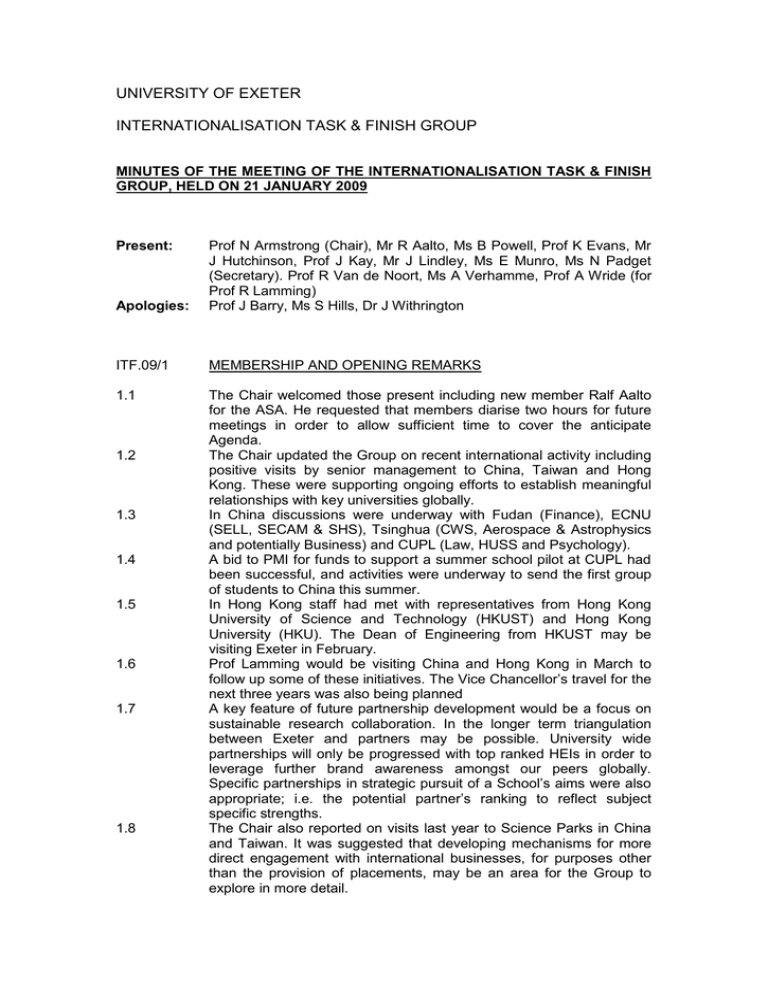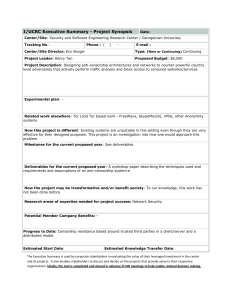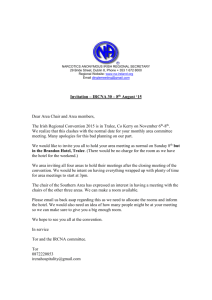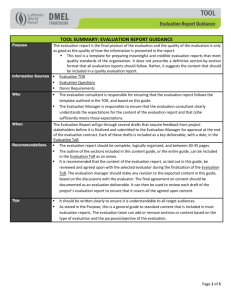UNIVERSITY OF EXETER INTERNATIONALISATION TASK & FINISH GROUP
advertisement

UNIVERSITY OF EXETER INTERNATIONALISATION TASK & FINISH GROUP MINUTES OF THE MEETING OF THE INTERNATIONALISATION TASK & FINISH GROUP, HELD ON 21 JANUARY 2009 Present: Apologies: Prof N Armstrong (Chair), Mr R Aalto, Ms B Powell, Prof K Evans, Mr J Hutchinson, Prof J Kay, Mr J Lindley, Ms E Munro, Ms N Padget (Secretary). Prof R Van de Noort, Ms A Verhamme, Prof A Wride (for Prof R Lamming) Prof J Barry, Ms S Hills, Dr J Withrington ITF.09/1 MEMBERSHIP AND OPENING REMARKS 1.1 The Chair welcomed those present including new member Ralf Aalto for the ASA. He requested that members diarise two hours for future meetings in order to allow sufficient time to cover the anticipate Agenda. The Chair updated the Group on recent international activity including positive visits by senior management to China, Taiwan and Hong Kong. These were supporting ongoing efforts to establish meaningful relationships with key universities globally. In China discussions were underway with Fudan (Finance), ECNU (SELL, SECAM & SHS), Tsinghua (CWS, Aerospace & Astrophysics and potentially Business) and CUPL (Law, HUSS and Psychology). A bid to PMI for funds to support a summer school pilot at CUPL had been successful, and activities were underway to send the first group of students to China this summer. In Hong Kong staff had met with representatives from Hong Kong University of Science and Technology (HKUST) and Hong Kong University (HKU). The Dean of Engineering from HKUST may be visiting Exeter in February. Prof Lamming would be visiting China and Hong Kong in March to follow up some of these initiatives. The Vice Chancellor’s travel for the next three years was also being planned A key feature of future partnership development would be a focus on sustainable research collaboration. In the longer term triangulation between Exeter and partners may be possible. University wide partnerships will only be progressed with top ranked HEIs in order to leverage further brand awareness amongst our peers globally. Specific partnerships in strategic pursuit of a School’s aims were also appropriate; i.e. the potential partner’s ranking to reflect subject specific strengths. The Chair also reported on visits last year to Science Parks in China and Taiwan. It was suggested that developing mechanisms for more direct engagement with international businesses, for purposes other than the provision of placements, may be an area for the Group to explore in more detail. 1.2 1.3 1.4 1.5 1.6 1.7 1.8 ITF.09/2 MATTERS ARISING 2.1 Terms of Reference for the four sub-groups had been circulated. Reports from the sub groups would be brought to the next meeting. 2.2 TOR 1: Growing overall international fee paying student numbers to a set target – and whether this can be achieved through a top down or bottom up approach (to be assessed by the appropriate sub-groups) and how this should be calibrated. It was noted that the International Office liaises with the UK Recruitment team in respect of recruitment of international students from the UK. Competition from the USA could increase as a result of the ‘Obama effect’, but economic and immigration factors were felt to be more relevant in the short to medium term. Increased use of agents by US universities was also potentially significant. The creation was noted of a Task & Finish Group to explore implications of the Points Based System (PBS). Action: Group will be kept informed of roll out of PBS and any implications for Exeter and sector as a whole. 2.3 TOR 2: Developing an ‘Exeter’ approach to building partnerships with key high quality HE partners overseas, e.g. the types of package we offer, where we offer it and to whom. AV and BP reported that School Managers had expressed a desire for provision of some standard guidance in respect of partnerships (e.g. legal and financial advice, potential models and guidance as to preferred approaches for research vs recruitment driven relationships). The request was made however to ensure that the ability to implement should be interpreted flexibly in order to meet client needs. It was agreed that University-level partnerships may need a higher degree of standardisation than School specific arrangements. The Group welcomed the idea of a central fund to support start-up costs associated with exploration of potential partnerships, but noted the need to focus support in such a way as to incentivise positive and timely outcomes. A clear link with RKT may be one approach whereby existing or anticipated research funding could be used to leverage further international funding. It was suggested that MOUs should include a provisional collaboration plan to identify resourcing implications and time specific benchmarks in order to facilitate the allocation of such resources. Action: International Office to proceed with publication online of templates for partnership activities and Register of Agreements, and to consider any necessary amendments to design of MOUs / MOAs. 2.4 TOR 3: Building strong international recognition of the University’s achievements and aspirations. The Chair reported that a meeting had been arranged with John O’Leary to discuss global rankings methodology. It was agreed that the TOR should be amended to reflect how the University intends to target improvements to our league table position, e.g. identify recommendations to improve the University’s global ranking, and international recognition of the University’s achievements and aspirations. Action: Chair to report outcomes at future meeting. 2.5 TOR 4: Developing new markets in Europe to build PGT and PGR routes. AW reported on the rationale for Business School consideration of European markets as a mechanism to reduce risk, increase cultural mix and grow PGR recruitment. There was recognition that exchanges may be more relevant than traditional full-time study. Action: AW to circulate Graduate Intern report of European opportunities for Business School. 2.6 TOR 5: Building an international environment on our campuses. JH reported on creation of an Internationalisation Group within the Students’ Guild which would review outcomes of the International Student Barometer (ISB), and in particular consider what interventions the Guild might undertake to encourage more formal and informal links between home and international students. The incoming Director of Campus Services and Director of Sport would both need to deliver services which responded to the needs of international customers. It was noted that the introduction of PBS had implications for the appointment of international staff. Personnel hoped to create a post to co-ordinate visa applications and training needs for international staff, but this was resource dependant. It was noted that cultural awareness training for staff, whether in a general or academic context, is currently ad hoc. The absence of a centrally co-ordinated ‘package’ was felt to be a barrier to improving service delivery and meeting customer needs Action: JH to keep Group informed of developments within the Guild. 2.7 TOR 6: Building an International curriculum for all students It was agreed that such activity needs to be embedded within the context of a revised Education Strategy. Addressing mechanisms to ensure School engagement was fundamental to success. It was noted that Sue Birkhill was completing a strategy on e-learning which may also be relevant. Action: JW to discuss with David Gibson and report to future meeting. 2.8 TOR 11: Encouraging all applicants to have an additional language at GCSE or equivalent. JK reported that to make this a formal entry requirement would be contrary to steps to increase overall tariff score. Instead consideration should be given to a means whereby students and staff could access a greater variety of language training whilst at University. ITF.09/3 ANY OTHER BUSINESS/DATE OF NEXT MEETING 3.1 TOR 7: Developing an overseas presence. Action: MEO & China sub groups to report. 3.2 TOR 8: The establishment of placement services, both abroad and with international organisations within the UK, for graduating and current students. It was noted that the Careers and Employment Service had proposed a possible model for Chinese placements, but that its implementation was dependant on suitable resourcing. The Chair reported that a contact at Fidelity Hong Kong had offered placements during a meeting with the Vice Chancellor. DARO would be taking forward. Action: NP to circulate CES report with minutes. 3.3 TOR 9: The provision of Study Abroad opportunities. Action: JW to provide position paper for future meeting. 3.4 TOR 10: Developing a vibrant staff exchange programme (academic and non-academic staff) with partner HEIs. JL reported that discussions were at an advanced stage regarding the acquisition of a property which could be used to provide short term accommodation. In the longer term accommodation in our around Duryard / Thomas Hall may also be suitable for such use. 3.5 TOR 12: The international role played by the University in respect of its research and consultancy services. Action: Sean Fielding to report. 3.6 AW reported that the Business School had just developed an online tool to collect information from staff about their international contacts. The technology may be of interest to other Schools wishing to do likewise. Dates of next meetings (two hours durations) as follows: Wednesday, 18 February 2009 Tuesday, 17 March 2009 Wednesday, 29 April 2009 Friday, 29 May 2009

![[IFATCA] Revised Terms of Reference](http://s2.studylib.net/store/data/010269825_1-91fc0f90143208d74a820988f7663d5c-300x300.png)



